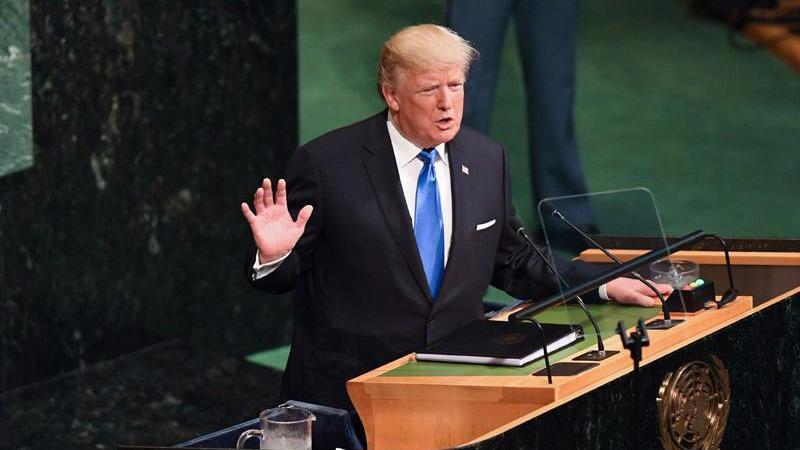
Financial Times comments: " ...North Korea is the issue of the day. The objective of a denuclearised Korean peninsula, pursued by the previous US administrations, is no longer an achievable goal. The best that can be hoped for is the suspension of nuclear and missile testing in return for security assurances and practical aid. Sanctions are designed to draw Kim Jong Un into a negotiation with that aim, and to pressure China to take a more active part. But it is very hard to see President Kim pulling back now. And China is more concerned about a new US-led war in Korea or the north collapsing and sending millions of refugees into China, than it is about living with a nuclear armed Pyongyang. The US only really has two strategic options: contain and deter the threat; or destroy it, which would require regime change. There are always military options. But all who have studied the secret Pentagon plans are sobered by the scale of loss of life in South Korea these would entail. There is also a risk of China reluctantly coming to the aid of the north as it did in the 1950s. Realistically, it seems the only practical option is containment. That requires missile defence systems to create uncertainty that nuclear-tipped missiles would ever get through to their target, and to deter any use of such weapons by being clear that North Korea would be destroyed if it ever tried to use them. Mr Kim may be hard for us to comprehend, but he is a rational actor and he is certainly not suicidal."
Financial Times writes that China has reduced debt as a proportion of gross domestic product for the first time in almost six years, in an indication it is tackling what is widely seen as the main economic threat. A recent JPMorgan report said that debt stood at 268 per cent of GDP at the end of the second quarter of this year, ending more than half a decade in which borrowing steadily increased — a legacy of the unprecedented monetary and financial stimulus the country activated to combat the 2008 financial crisis. The proportion for the first quarter had been marginally higher at 269 per cent. Concern about high debt levels led Standard & Poor's to downgrade China's sovereign rating last week — the first time it has done so since 1999. The International Monetary Fund warned in August that Beijing's reluctance to rein in borrowing was "dangerous". China's debt-to-GDP ratio was less than 150 per cent in 2007 and analysts have long warned that such a rapid build-up in borrowing has historically ended in financial crisis. China has reduced debt as a proportion of gross domestic product for the first time in almost six years, in an indication it is tackling what is widely seen ...
- 2017-09-20 China finds Trump threats to North Korea unhelpful
- 2017-09-19 Why China's Xi Jinping is missing from the U.N. General Assembly
- 2017-09-18 Korean peninsula draws range of military drills in show of force against North Korea
- 2017-09-15 China is getting tougher on North Korea—to stop the US from getting tougher on it
- 2017-09-14 Trump Blocks China-Backed Bid to Buy U.S. Chip Maker
- 2017-09-13 Trump says UN North Korea sanctions are 'not a big deal'
- 2017-09-12 After U.S. Compromise, Security Council Strengthens North Korea Sanctions
- 2017-09-11 Indonesia, Long on Sidelines, Starts to Confront China's Territorial Claims
- 2017-09-08 'Lips and teeth' no more as China's ties with North Korea fray
- 2017-09-07 China agrees U.N. action, and talk, needed to end North Korea crisis
- The Washington Post China watches in frustration as North Korea crisis enters dangerous spiral
- Reuters China to push for greater cooperation on graft, terrorism at Interpol meeting
- Reuters Chinese cities impose new property control measures
- Financial Times China's yoghurt sales poised to overtake milk for first time
- Forbes Bitcoin Trades Sideways As Investors Look To China
- Bloomberg China Could Seize a Bit of the Skies
- New York Times 68 Things You Cannot Say on China's Internet
- Reuters Gold companies take a shine to China's Silk Road
- uk.reuters.com Chinese medical devices maker to buy US-based Argon for $850 mln
- Financial Times Russia and China quietly build business bonds
- TIME US Flies Bombers Off North Korea Coast in Show of Force
- Bloomberg China's Slipping Export Crown Could Be Saved by Technology
- RT News North Korea is US stage-managed geopolitical theater to counter China - analyst
- Financial Times The nuclear threat can be contained by diplomacy
- Bloomberg More Sanctions, Fewer Insults Against North Korea
- Fox News Why Trump's economic moves against North Korea may do more to tame Kim than any insult
- www.huffingtonpost.com The Pursuit of Money and Natural Resources: The Untold Story Behind Myanmar's Rohingyas
